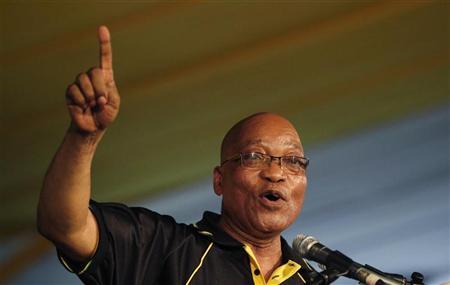(Reuters) – South African President Jacob Zuma, fresh from a landslide re-election as head of the ruling ANC, on Thursday promised to crack down on corruption and feuding that has shaken confidence in the party’s leadership of Africa’s top economy.

In a speech to close a week-long ANC elective conference, Zuma called on the 100-year-old African National Congress to “root out” faction-fighting and the use of money to buy members or influence within the party.
“The primary task of the ANC going forward is to work for unity,” said Zuma, whose re-election this week ended months of feverish speculation over a challenge from Deputy President Kgalema Motlanthe.
“It is clear that the ANC is renewing itself already,” a smiling Zuma told the packed audience.
By winning a fresh term to lead the ANC at the conference in the central city of Bloemfontein, Zuma has virtually guaranteed himself another term as president of South Africa through 2019, given the party’s dominance of domestic politics.
Yet there are fears – both inside and outside the party – that Zuma has steered Nelson Mandela’s former liberation movement away from its idealistic beginnings and into a morass of graft, cronyism and a corrosive culture of self-enrichment.
The party that took power at the end of apartheid in 1994 is seeing some decline its once-unassailable popularity, hit by charges that corruption has siphoned off billions of dollars meant to improve the lives of the country’s poor black majority.
The ANC has admitted that members running local governments are often not up to the task, and pledged to set up an integrity committee to hold them accountable.
“This will be our primary weapon in our fight against corruption,” said ANC official David Makhura, who sits on the party’s organizational renewal committee.
Some ANC insiders say Zuma – who has faced corruption charges but has never been convicted – is the wrong person to lead the renewal drive.
“Zuma is more a part of the problem then the solution. If we don’t change leaders, the ANC will be heading for deep troubles,” said a senior party member from Gauteng province, who asked not to be named.
The ANC dominates local politics due to its still-admired role in bringing down apartheid while the main opposition Democratic Alliance is seen as the party of the white minority.
SHORING UP IMAGE
To restore the party and government’s battered image, the conference chose 60-year-old anti-apartheid hero and millionaire businessman Cyril Ramaphosa as Zuma’s deputy in the ANC, hoping for a boost from his political credentials and reputation for integrity.
But there are questions whether Ramaphosa – now South Africa’s second-richest black executive – can strike a chord with the poor and unemployed masses as he did when he led striking mineworkers against their white bosses in the 1980s.
Ramaphosa will replace Motlanthe, whose challenge to Zuma for the ANC top job was crushed at the conference. Zuma named Motlanthe to head up a political education program for ANC members, in what could be seen as a political banishment.
The president appeared to settle another old score when he said the ANC would not tolerate indiscipline, a clear reference to former party Youth League leader Julius Malema, who became Zuma’s nosiest critic after expulsion from the ANC this year.
“We will be able to deal with the comrades who disrupt ANC meetings,” Zuma said to cheers and applause from the floor.
“There must be consequences for such ANC members,” he said.
Zuma said the ruling party would tackle the poverty, inequality and unemployment that still afflict South Africa with decisive policies focusing on industrialization and Black Economic Empowerment, which seeks to put more of the economy in the hands of the black majority.
Nearly two decades after Mandela led the ANC to bring down apartheid, critics say the party has not done enough to fix worsening inequality and an unemployment rate stuck at around 25 percent.
Zuma said the health of 94-year-old Mandela, who has spent nearly two weeks in hospital, had improved.
In a sign of the social and labor challenges facing the ANC, police fired rubber bullets on Thursday to disperse protesting gold workers, the latest flare-up of violent labor unrest that has shaken South Africa this year.
And as the ANC conference members streamed home, there were those around the country hoping that the pledges for renewal and action would lead to concrete change.
Sabelo Baza, 25, who lives in the township of Botshabelo, down the highway from the venue of ANC meeting, has given up on the party he once supported.
“I have heard promises and promises about jobs. I am unemployed and I don’t trust the ANC anymore,” he said.
(Writing by David Dolan; Editing by Pascal Fletcher and Andrew Heavens)





